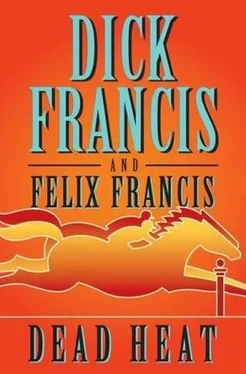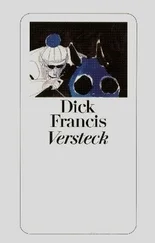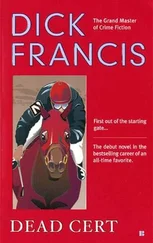I was completely baffled. I called Angela Milne. She didn’t answer and so I left a message on her voice mail.
“Angela, it’s Max Moreton,” I said. “I have checked the ingredients list for last Friday’s dinner and there are no kidney beans anywhere. Everything, other than the rolls, was made by me from basic ingredients. I cannot see how any kidney bean toxin could have been present. Are you sure the test results are accurate? Could you please ask whoever did them to have another look? They simply cannot be right.”
I put the phone down and it rang immediately before I had even removed my hand.
“Angela?” I answered.
“No,” said a male voice. “Bernard.”
“Bernard?” I said.
“Yes, Bernard Sims,” said the voice. “She’s a musician. Plays the viola.”
“Sorry,” I said. “I’m afraid you’ve lost me.”
“The lady is a musician.”
“Who, Bernard Sims?”
“No, Caroline Aston,” he said. “I’m Bernard Sims, Mr. Winsome’s lawyer.”
The penny dropped at last.
“Oh, I see,” I said. “Sorry about that, I was thinking about something else.” I sorted my thoughts. “So whose guest was Miss Aston at the dinner?”
“No one’s. She was a member of the string quartet that played during the evening,” said Bernard. “She obviously had the same dinner as all the others who were ill.”
I remembered the players, four tall, elegant, black-dressed girls in their twenties. I also remembered being slightly fed up that night that I was working so hard that I hadn’t had a chance to chat them up between their rehearsal and the start of the reception. Odd, I thought, how emotions worked. Far from still wanting to wring her neck, I was sorry now that she had been ill in the first place. I told myself to stop being such a softie, that I was probably perfectly justified in sticking pins in the voodoo doll, and that, anyway, she would almost certainly have a six-foot-six bodybuilding boyfriend who would eat me for breakfast if I went near her.
“Where does she work?” I asked.
“Not entirely sure of all the details just yet. I’m still working on it,” he said. “She seems to play for the RPO, but I can’t work out why she was in Newmarket in a string quartet last Friday.”
“RPO?” I asked.
“Sorry. Royal Philharmonic Orchestra. Real professional stuff. She must be good.” I remembered that, to my untrained ear, they had all sounded good, as well as being pleasing on the eye. “Do you want her address?”
“Sure,” I said, not knowing quite what I would do with it.
“She lives in Fulham,” he said, “on Tamworth Street.” He gave me the full address, and her telephone number too. I wrote them down.
“How did you get it?” I asked.
He laughed. “Trade secret.”
I assumed that what he had done to get the information wasn’t entirely legal, so I didn’t push it.
“What should I do?” I asked.
“Don’t ask me,” he said. “And don’t tell me either. I don’t want to know.” He laughed again. I’d never come across a lawyer like him before. All the others I had met had been so serious. “Perhaps you should ask her out to dinner but taste all her food before she eats it.” He guffawed at his little joke. He was clearly enjoying himself hugely, and was still chuckling as he hung up the phone.
I wish I felt like laughing with him.
Gary came into the office. “There’s a bird here to see you. Says you would be expecting her.”
“Did this bird give you her name?” I asked.
“Harding, I think she said. From some newspaper.”
The news editor of the Cambridge Evening News. Since having received the information from Angela Milne, I was not sure if this was now such a good idea. Perhaps a low profile would have been the best approach. If I made too much of how clean and hygienic my kitchen was, would I be setting myself up for an even bigger fall if and when the papers reported that I had been cautioned, fined or imprisoned for “rendering food injurious to health,” as section 7 of the Food Safety Act of 1990 so concisely defined it? Well, it was too late now. If I didn’t see her after making the arrangements, then she would probably write something nasty about me or the restaurant and even more damage would be done.
She was waiting for me in the bar, thirtyish, with shoulder-length dark hair tied back in a ponytail. She was seriously dressed in a dark skirt down to her knees, with a white blouse, and she carried a black, businesslike briefcase. I bet she would have just loved to have been referred to by Gary as “a bird.”
“Ms. Harding,” I said, holding out my hand, “I’m Max Moreton.”
She looked at my hand for a moment, then shook it gingerly. Clearly, she believed that her health was in danger anywhere near me or my restaurant.
“Would you care for a cup of coffee?” I asked.
“Oh no, no thank you,” she said with just a touch of panic in her voice.
“Ms. Harding,” I said with a smile, “my coffee is quite safe, I assure you. Perhaps you would like to see the kitchen to satisfy yourself that it’s clean. I assure you, it is. But don’t take my word for it. Ask the local authority. They inspected it on Monday, and the inspector told me it was the cleanest and most hygienic kitchen he had ever visited.” It was a little bit of an exaggeration, but so what?
She didn’t seem totally reassured, but she did reluctantly agree to come with me into the kitchen.
“Did you bring a photographer?” I said over my shoulder as I led her through the swinging door from the dining room.
“No,” she said. “There wasn’t one available on such short notice, but I brought a camera. These days, all our reporters carry their own digital cameras. If they take enough shots, then one of them usually turns out to be good enough to print.” She looked from side to side as we went past the serving station, where the plated meals were kept under infrared lamps to keep warm before being collected by the waiters and waitresses and taken out into the dining room. She walked with her free hand up near her face, as if she might touch something and be contaminated if she let it down.
Oh dear, I thought, this is going to take more persuasion than I had imagined.
“This is the point at which the kitchen and dining room meet,” I said. “Kitchen staff on one side, waiters on the other.”
She nodded.
“Perhaps you might want to take a picture,” I prompted.
“No,” she said. “It’s fine. But what I really want to do is talk to you about the bombing.”
“OK,” I said, “we will. But I want that coffee first.” I could have made the coffee in the bar, but I was determined to take her through to my kitchen even if she wouldn’t take a picture.
We went on right to the back, where I had purposely placed the coffee machine that usually sat on the sideboard in the dining room. “Are you sure you won’t have a cup?” I said. “It’s freshly brewed.”
She spent a moment or two looking around her at all the shining stainless steel. The work surfaces were so bright she could have fixed her makeup in them, and the cooktops around the gas burners positively gleamed. I noticed her relax a fraction.
I held out a mug of steaming coffee. “Would you like milk and sugar?” I asked.
“Just a little milk,” she said. “Thank you.” I smiled. Round one to Moreton.
“Is all this stuff new?” she asked, putting her briefcase on the floor and taking the mug of coffee.
“No,” I said. “Most of it is six years old, although that stove”-I pointed to the one at the end-“was added a couple of years ago, to make life a little easier.”
“But it’s all so shiny,” she said.
Читать дальше












